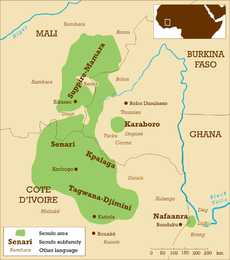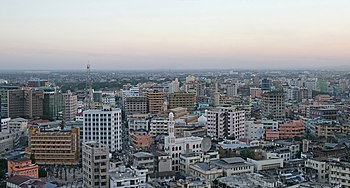Portal:Africa



Africa is the world's second-largest and second-most populous continent after Asia. At about 30.3 million km2 (11.7 million square miles) including adjacent islands, it covers 20% of Earth's land area and 6% of its total surface area. With nearly 1.4 billion people as of 2021, it accounts for about 18% of the world's human population. Africa's population is the youngest among all the continents; the median age in 2012 was 19.7, when the worldwide median age was 30.4. Based on 2024 projections, Africa's population will reach 3.8 billion people by 2099. Africa is the least wealthy inhabited continent per capita and second-least wealthy by total wealth, ahead of Oceania. Scholars have attributed this to different factors including geography, climate, corruption, colonialism, the Cold War, and neocolonialism. Despite this low concentration of wealth, recent economic expansion and a large and young population make Africa an important economic market in the broader global context. Africa has a large quantity of natural resources and food resources, including diamonds, sugar, salt, gold, iron, cobalt, uranium, copper, bauxite, silver, petroleum, natural gas, cocoa beans, and.
Africa straddles the equator and the prime meridian. It is the only continent to stretch from the northern temperate to the southern temperate zones. The majority of the continent and its countries are in the Northern Hemisphere, with a substantial portion and a number of countries in the Southern Hemisphere. Most of the continent lies in the tropics, except for a large part of Western Sahara, Algeria, Libya and Egypt, the northern tip of Mauritania, and the entire territories of Morocco and Tunisia, which in turn are located above the tropic of Cancer, in the northern temperate zone. In the other extreme of the continent, southern Namibia, southern Botswana, great parts of South Africa, the entire territories of Lesotho and Eswatini and the southern tips of Mozambique and Madagascar are located below the tropic of Capricorn, in the southern temperate zone.
Africa is highly biodiverse; it is the continent with the largest number of megafauna species, as it was least affected by the extinction of the Pleistocene megafauna. However, Africa also is heavily affected by a wide range of environmental issues, including desertification, deforestation, water scarcity, and pollution. These entrenched environmental concerns are expected to worsen as climate change impacts Africa. The UN Intergovernmental Panel on Climate Change has identified Africa as the continent most vulnerable to climate change.
The history of Africa is long, complex, and varied, and has often been under-appreciated by the global historical community. In African societies the oral word is revered, and they have generally recorded their history via oral tradition, which has led anthropologists to term them oral civilisations, contrasted with literate civilisations which pride the written word. During the colonial period, oral sources were deprecated by European historians, which gave them the impression Africa had no recorded history. African historiography became organized at the academic level in the mid-20th century, and saw a movement towards utilising oral sources in a multidisciplinary approach, culminating in the General History of Africa, edited by specialists from across the continent. (Full article...)
Selected article –
Nafaanra (sometimes written Nafaara, pronounced [nafãːra]), also known as Nafanan or Nafana, is a Senufo language spoken in northwest Ghana, along the border with Ivory Coast, east of Bondoukou. It is spoken by approximately 90,000 people. Its speakers call themselves Nafana, but others call them Banda or Mfantera. Like other Senufo languages, Nafaanra is a tonal language. It is somewhat of an outlier in the Senufo language group, with the geographically-closest relatives, the Southern Senufo Tagwana–Djimini languages, approximately 200 kilometres (120 mi) to the west, on the other side of Comoé National Park.
The basic word order is subject–object–verb, like Latin and Japanese. Like other Niger–Congo languages, it has a noun class system, with nouns classified according to five different classes, which also affects pronouns, adjectives and copulas. The phonology features a distinction between the length of vowels and whether they are oral or nasal (as in French or Portuguese). There are also three distinct tones, a feature shared with the other Senufo languages. Nafaanra grammar features both tense and aspect which are marked with particles. Numbers are mainly formed by adding cardinal numbers to the number 5 and by multiplying the numbers 10, 20 and 100. (Full article...)
Featured pictures –
Did you know (auto-generated) -

- ... that Louise Fulton was the first African American to win a professional bowling tournament?
- ... that many African countries provide for legal abortion in their reproductive health laws, but such laws have been passed without grounds for legal abortion in Madagascar and in Senegal?
- ... that in 1948, Thomas Yarborough became the first African American to be elected as a city council member in California?
- ... that Mackay Davashe wrote "Lakutshona Ilanga", the English version of which, sung by Miriam Makeba, became the first South African piece to chart on the Billboard Hot 100?
- ... that police in Indianola, Mississippi, shot an unarmed 11-year-old African-American boy after responding to his 9-1-1 call for help at his home?
- ... that women seeking abortions in Eswatini or in Lesotho may travel to neighbouring South Africa, where it is legal?
Categories
Selected biography –
Jean Bolikango, later Bolikango Akpolokaka Gbukulu Nzete Nzube (4 February 1909 – 17 February 1982), was a Congolese educator, writer, and politician. He served twice as Deputy Prime Minister of the Republic of the Congo (now the Democratic Republic of the Congo), in September 1960 and from February to August 1962. Enjoying substantial popularity among the Bangala people, he headed the Parti de l'Unité Nationale and worked as a key opposition member in Parliament in the early 1960s.
Bolikango began his career in the Belgian Congo as a teacher in Catholic schools, and became a prominent member of Congolese society as the leader of a cultural association. He wrote an award-winning novel and worked as a journalist before turning to politics in the late 1950s. Though he held a top communications post in the colonial administration, he became a leader in the push for independence, making him one of the "fathers of independence" in the Congo. The Republic of the Congo became independent in 1960 and Bolikango attempted to organise a national political base that would support his bid for a prestigious office in the new government. He succeeded in establishing the Parti de l'Unité Nationale and promoted both a united Congo and strong ties with Belgium. Older than most of his contemporaries and commanding significant respect—especially among his Bangala peers, he was seen as the Congo's "elder statesman". Regardless, his attempts to secure a position in the government failed and he became a leading member of the opposition in Parliament. (Full article...)
Selected country –
 |
 |
||

| |||
Ghana, officially the Republic of Ghana, is a country in West Africa. It borders Côte d'Ivoire to the west, Burkina Faso to the north, Togo to the east, and the Gulf of Guinea to the south. It was inhabited in pre-colonial times by a number of ancient kingdoms, including the Ga Adangbes on the eastern coast, the inland Empire of Ashanti and various Fante states. Trade with European states flourished after contact with the Portuguese in the 15th century, and the British established a crown colony, Gold Coast, in 1874. Upon achieving independence from the United Kingdom in 1957, the name Ghana was chosen for the new nation to reflect the ancient Empire of Ghana that once extended throughout much of west of Africa.
Ghana is a republic and member of the Commonwealth of Nations. Its head of state is President John Agyekum Kufuor, the ninth leader of the country since independence. The government sits at Osu Castle. The Parliament of Ghana is unicameral and dominated by two main parties, the New Patriotic Party and National Democratic Congress. (Read more...)
Selected city –
Pointe-Noire (French pronunciation: [pwɛ̃t.nwaʁ]; Kongo: Njinji, French: Ndjindji with the letter d following French spelling standards) is the second largest city in the Republic of the Congo, following the capital of Brazzaville, and an autonomous department and a commune since the 2002 Constitution. Before this date it was the capital of the Kouilou region (now a separate department). It is situated on a headland between Pointe-Noire Bay and the Atlantic Ocean. Pointe-Noire is the main commercial centre of the country and has a population of 1,420,612 inhabitants in 2023. (Full article...)
In the news
- 26 January 2025 – Boko Haram insurgency
- At least 27 Nigerian soldiers, including the commanding officer of the 149th Battalion, are killed and dozens of others wounded in a suicide bombing carried out by an Islamic State fighter in the Malam-Fatori, Borno State, Nigeria. (Al Jazeera) (Inquirer.net via AFP)
- 26 January 2025 – Democratic Republic of the Congo–Rwanda tensions (2022–present)
- UN Secretary General Antonio Guterres urges Rwanda to end its support for rebels in DR Congo and withdraw Rwandan soldiers from Congolese territory. (Al Jazeera)
- Congolese foreign minister Thérèse Kayikwamba Wagner calls Rwanda's military support for M23 rebels a "declaration of war." (DW)
- 25 January 2025 – Sudanese civil war
- Siege of El Fasher
- At least 70 people are killed in a drone attack on the Saudi Hospital, one of the last functioning hospitals in El Fasher, Sudan. (AP)
- 25 January 2025 – Kivu conflict
- Six peacekeepers, three from South Africa and three from Malawi, are killed as fighting intensifies in the Democratic Republic of the Congo between government forces and M23 rebels, the latter backed by the Rwandan military. (24news) (The Guardian)
Updated: 3:05, 27 January 2025
General images -
Africa topics
More did you know –
- ...that members of the Senegalese rap group Daara J were hired by campaigners in the Senegalese election of 2000 to edit their speeches?
- ...that Senegalese hip hop group Positive Black Soul's name abbreviation, PBS, is a play on that of the Parti Démocratique Sénégalais, PDS?
- ...that Mamadou Diabaté, a Malian kora player, was nominated for a Grammy Award in 2005, but lost to his cousin Toumani Diabaté?
- ...that, in November 2007, The Sowetan published an article which erroneously claimed that South African political activist Dan Mokonyane had died?
Related portals
Major Religions in Africa
North Africa
West Africa
Central Africa
East Africa
Southern Africa
Associated Wikimedia
The following Wikimedia Foundation sister projects provide more on this subject:
-
Commons
Free media repository -
Wikibooks
Free textbooks and manuals -
Wikidata
Free knowledge base -
Wikinews
Free-content news -
Wikiquote
Collection of quotations -
Wikisource
Free-content library -
Wikispecies
Directory of species -
Wikiversity
Free learning tools -
Wikivoyage
Free travel guide -
Wiktionary
Dictionary and thesaurus

























































































